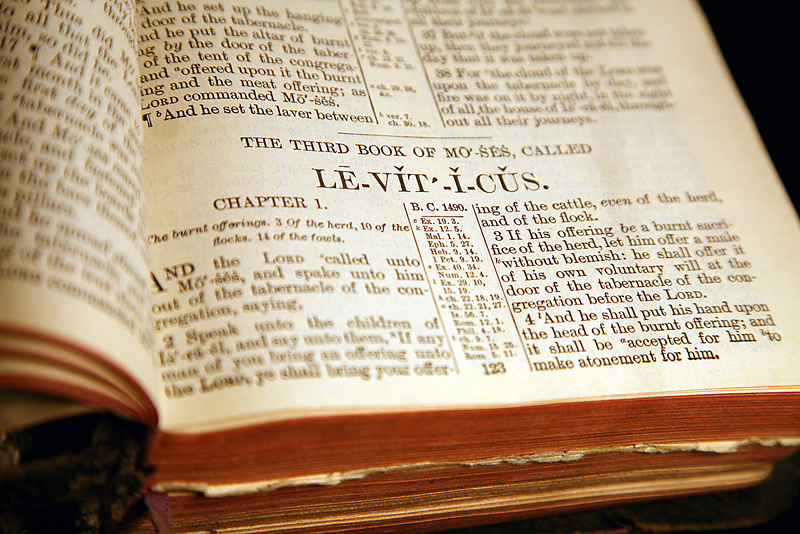This new video will appear only on our Hoshana Rabbah Rumble channel, since it contains contents that the antichrist activists at YouTube will undoubtedly ban. Please subscribe to our Rumble channel, so you don’t miss any of our life-changing, YHVH-glorifying and edifying videos for your blessing! Shalom. Please subscribe at https://rumble.com/c/HoshanaRabbah.
Tag Archives: Blessings and Curses
Bechukotai—Curses Upon the Disobedient: Terror, Pestilence & Famine
It’s time to wake up and face reality! When we obey the Creator’s laws we are blessed, and when we disobey his commandments we are cursed. The rise of national and global terrorism, rampant diseases and the threat of famines, even in the first world nations, is the consequence of our sinning against the Creator, of breaking his laws, and is a fulfillment of end time biblical prophecy. There is no need to be confused, frightened or alarmed by the crazy events going on around us if we are living righteously. In this video, we identify the problem, its root cause and the solution.
Leviticus 26 on Divine Blessings and Curses

Leviticus 26
Divine Blessings and Curses Are Based on Obedience to YHVH’s Torah-Word
As divine blessings come upon people for Torah obedience, so do curses come upon a people who have forgotten their Elohim because they have been blessed materially and in their self-sufficiency have forgotten who is the source of their blessings as this chapter shows. These are immutable laws that are written in the universe and no human-devised philosophical or religious ideologies regardless of their cleverness can circumvent them. To go against these laws is like attempting to push a giant boulder up a steep mountainside. Eventually the boulder will role backwards crushing the pusher. What wisdom can be learned from this passage on blessings and curses?

YHVH’s Torah instructions continually stresses that blessings are contingent upon obedience to YHVH. Similarly, Yeshua reveals that rewards in his everlasting kingdom are also contingent on obedience to his Torah-laws. The greater the obedience, the greater the reward (Matt 5:17).These principles are universal, yet how prone humans are to forget the cycles of history that repeat themselves over and over again like the unstoppable turning of giant millstone grinding into powder those who refuse to learn the lessons from the past. Each generation proudly asserts its exceptionalism and that, somehow, it is immune to YHVH’s inexorable and immutable principles of divine judgment. Only in the perfect hindsight of history can we see the fallacy of this assumption. Ancient Israel failed to learn these lessons as have subsequent people who are both ignorant of Scripture as well as many who claim to follow the Bible.
In the case of America, and Great Britain before her (and other formerly European Christian nations as well), there was in times past a national consciousness of core biblical values and, to one degree or another, a general public acknowledgement, acceptance of and respect for the Elohim of the Bible. However, as the historical record reveals, as a nation becomes blessed, it reaches an apogee of prominence, power and wealth where it becomes rich and increased with goods and no longer needs Elohim—or so it thinks. It then becomes materially fat and forgets the source of its wealth and falls into a state of self-sufficiency leading to spiritual blindness in that it fails to recognize its true spiritual state (recall YHVH’s warning to a lukewarm church in Rev 3:14–22). This can happen to individuals, churches and to whole societies.
Because YHVH loves his people and wants to walk among them, to be their Elohim and to bless them (Lev 26:12), when they disobey him and walk in ways that are harmful to their well-being, like any loving parent, he is forced to discipline them. Again and again he sends them his prophets and watchmen to warn them that they are on a path of self-destruction. But because of pride, most people refuse to humble themselves and repent (Lev 26:40–41). It is the same old story over and over again. Human pride insists that “judgments cannot happen to us because we are so special, ” and “All things will continue as they have from the beginning and no evil shall befall us.” Such a self-assured individual and society retorts in mocking and scoffing tones in response to all those who would hold them accountable for their errant ways (2 Pet 3:3–7). If only the great people, nations and empires that have already trodden this well-worn path and are now in the dust bin of history could speak from their graves and this generation had heart ears to hear!
As a loving Father, YHVH does not lower the gavel of his full disciplinary judgments immediately upon his wayward children. He increases the dosage of his spiritual medicine incrementally in hopes that each successive ratcheting down of his judgments will bring healing to his spiritually apostate children such that they will humble themselves, confess their iniquity (or Torahlessness, Lev 26:40) and repent of their sin and submit to his laws, so that he can bless them.
In this chapter, YHVH reveals four sets of judgments with each one becoming seven times more severe than the previous one (Lev 26:18, 21, 24, 28). This reminds us of YHVH’s end-times judgments upon a rebellious world that has given itself over to devil worship just prior to the return of Yeshua as prophesied in the book of Revelation. In that book, there are seven seals, seven trumpets, seven thunders and, finally, seven bowl judgments.
What can you do? You may not be able to change society, but a societal change begins one step and one life at a time; it starts with your life! That is the only thing for certain that you can change. No one person can turn the whole earth into a beautiful garden, but you can start by eradicating the weeds from your own garden. You know what needs to be done. Just listen to your conscience—to YHVH’s Spirit knocking at the door of your heart (Rev 3:20), and then repent and obey YHVH and his commandments. It is that simple.
The corollary to this passage on blessings and curses with regard to Torah obedience is Deuteronomy chapter 28.
Some More Reflections on Divine Judgment

By dictionary definition, judgment is “a decision of a court or judge; a misfortune or calamity viewed as a divine punishment.”
The Bible speaks a lot about judgment. When we read about the subject of judgment in the Bible, it usually pertains to the “other guy” involving someone in the past, or someone in the future, or someone that we consider to be more sinful than we are. The problem is that our pride prevents us from thinking that Elohim’s judgment could happen to us.
Judgment is nothing more than suffering the consequences of our actions. It’s simply a function of the law of cause and effect. If you jump off of a building, you’ll suffer the consequences of your actions when you hit the ground. Similarly, when we break YHVH’s commandments, we will suffer the consequences. Judgment is also a matter of degrees. To the degree that we obey his commandments, we’ll reap the blessings of obedience. Conversely, to the degree we disobey them, we’ll reap the negative consequences (Lev 26:3ff cp. 14ff) in the same way that jumping off a two foot ledge versus a 500 foot ledge has different consequence—a twisted ankle compared to death. For most of us, our actions with regard to obedience to YHVH’s laws are a mixture of both good and evil, so we’re reaping both blessings and curses at the same time.
Continue readingThe Bible Law of Reciprocity—You Reap What You Sow
Genesis 28:22, I will surely give the tenth. To whom would Jacob ultimately tithe? We don’t know, but Jacob may have been making a prophecy about his descendants bringing their tithes and offerings to the house of El or the temple that would eventually be built on that exact spot.
Jacob’s dream in Genesis 28 was his first, life-changing personal encounter with the Elohim of his fathers (Gen 28:10ff). What was his response? It was to serve YHVH and to worship him by giving him one-tenth (a tithe) of his increase (verse 22). What prompted this response on Jacob’s part? Why was such a response appropriate?
When did you have your first encounter with your Heavenly Father and Master? In following the example of Jacob, have you faithfully used the first fruits of your increase to honor, worship and express your gratitude to him ever since? If not, why not? Scripture calls not tithing “robbing Elohim” and that as a result a curse may be on your finances (see Mal 3:8–11). Proverbs 3:9 lays out a solid truth about how tithing is a form of worshipping the Creator. “Honour [glorify] YHVH with thy substance, and with the first fruits of all thine increase, so shall thy barns be filled with plenty, and thy presses shall burst out with new wine.”
The Scriptures reveal the importance of the spiritual law of reciprocity; namely, you reap what you sow (Gen 8:22; Gal 6:7–9). If you don’t sow you will not reap. If you sow evil or good you will reap the same. Jacob had to learn this law the hard way. In Job 4:8 we read, “Even as I have seen, they that plow iniquity, and sow wickedness, reap the same.”
Jacob gained the birthright through posing as Esau (a deception) and Laban in turn deceives Jacob by putting Leah under the veil posing as Rachel in Jacob’s marriage bed. It is very easy to see the principle of reaping and sowing in others’ lives, but can we see it in our own life? This is very difficult to do! Aren’t we prone to concoct every excuse and argument imaginable to justify our sinful actions and then blame the results on others? Prayerfully take a long and hard look at your life, examine hardships and trials, and honestly ask yourself the question: Am I reaping what I have sown? It is never too late to repent and make a course correction—to bring your life into agreement with YHVH’s Word and will, so you can start reaping Elohim’s blessings.
Honesty, patience and submission to authority are fruits of righteousness. What did YHVH have to teach Jacob about these fruits of the Spirit? Jacob was impatient in submitting to YHVH’s will and waiting for the birthright to come to him in a righteous way. How did YHVH use Laban to correct these character flaws in Jacob? Jacob had to go into the Babylonian world for a season in order to be refined before being ready to be a patriarch worthy of honor and an example of righteousness as the father of the twelve tribes of Israel.
What is YHVH allowing you to go through to refine you of character flaws and defects to prepare you for the future mission he has for you? Are you submitting to his refining fires that are burning the wood, hay and stubble out of your life (1 Cor 3:12–15), or are you resisting him thereby forcing him to “turn up the heat” of his discipline to help you “to get the point” and learn your lesson? (Read Heb 12:5–15.)
Jacob was forced to go east (toward Babylon) as a form of exile and punishment for his sins. After serving as a bondservant to Laban for 20 years, he returned westward to Canaan, the land of promise. This eastward-westward movement was a pattern followed by Jacob’s descendants later on several occasions. Even Abraham left Babylon and went west to Canaan. What are the prophetic implications of this in the end times when YHVH is calling his people to “come out” of spiritual Babylon (Rev 18:4)?
Jacob builds a complete family in “exile” consisting of twelve tribal leaders. To return to the Promised Land of Canaan, he had to encounter Esau (or Edom) who is the father of many of the modern day Arab peoples. What is this a prophetic picture of? Did history repeat itself when the Jewish exilic remnant again encountered Esau’s descendants when they come back from Babylon under Ezra and Nehemiah? Isn’t this same thing happening again in our time as the exiled Jews return to Israel—their ancestral and Elohim-given homeland? Who currently is opposing their return and is openly vowing to annihilate them? Consider Edom’s opposition to Jacob past, present and future. What (or who) is really behind this opposition to Israel’s (Jacob’s) inheriting his birthright that includes a land inheritance whose borders are from Egypt to the Euphrates River in modern Iraq?
Jacob vowing to tithe to Elohim was his acknowledging his submission to Elohim and to his will—that Elohim was the Lord over his life. Complete submission to Elohim came hard for Jacob. The same is true for us, and when we tithe this is an act of worship of Elohim and acknowledgement that we have come to a higher place of surrender in our lives.
The Old and New Covenants and the Law of Cause and Effect
Deuteronomy 7:12, Because you listen. This verse shows the conditional nature of the Mosaic Covenant. Blessings are conditional upon obedience to YHVH’s Torah instructions in righteousness. It was a person’s choice to obey or not. Either way, the law of cause and effect would come into play. Blessings for obedience and curses for disobedience.
The same is true with the New Covenant. If we place our faith in Yeshua the Messiah,who is the Living Torah, and love him by keeping his commandments (John 14:15), we will not only be blessed physically blessed here and now, but we will be blessed with eternal life. Those who refuse to place their faith in Yeshua and obey his commandments will receive the fruit of their disobedience now, and will also perish in the lake of fire.
The law of cause and effect still applies to both the Mosaic Covenant and the New Covenant, and humans will reap the consequence of their actions based on the choices they make whether good or bad. It’s that simple.
Judgment, judgment, judgment and more judgement—YHVH is knocking on the door
Leviticus 26:1–46, Blessing and curses based on obedience to YHVH’s Torah-Word. The corollary to this passage is Deuteronomy chapter 28. These judgments come upon a people who have forgotten their Elohim because they have been blessed materially and in their self-sufficiency have forgotten who the source of their blessings is, and that their blessings are contingent upon obedience to YHVH. These principles are universal, yet how we tend to forget the cycles of history that repeat themselves over and over again like the unstoppable turning of giant millstone grinding into powder those who refuse to learn the lessons from the past. Each generation proudly asserts it’s exceptionalism and that, somehow, it’s immune to YHVH’s inexorable and immutable principles of divine judgment. Only in the perfect hindsight of history can we see the fallacy of this assumption. Ancient Israel failed to learn these lessons as have subsequent nations who claimed to follow the Bible.
In the case of America, and Great Britain before her (and other Christian nations as well), there was in former times a national consciousness of core biblical values and, to one degree or another, a public acknowledgement, acceptance of and respect for the God of the Bible. However, as a nation becomes blessed, it reaches an apogee of prominence, power and wealth where it becomes rich and increased with goods and no longer needs Elohim — or so it thinks. It become fat and forgets the source of its wealth and falls into a state of self-sufficiency leading to spiritual blindness to recognize its true spiritual state (recall YHVH’s warning to a lukewarm church in Rev 3:14–22). This can happen to individuals, churches and to whole societies.
Because YHVH loves his people and wants to walk among them, to be their Elohim and to bless them (Lev 26:12), when they disobey him and walk in ways that are harmful to their well-being, like any loving parent, he is forced to discipline them. Again and again he sends them his prophets and watchmen to warn them that they’re on a path of self-destruction. But because their hearts are uncircumcised, they refuse to humble themselves and repent (Lev 26:41). It’s the same old story over and over again. Human pride insists that “judgments can’t happen to us because we’re so special.” “All things will continue as they have from the beginning” a self-assured society retorts in mocking and scoffing tones to all those who would hold them accountable for their errant ways (2 Pet 3:3–7). If only the great nations and empires that have already trod this well-worn path and are now in the dust bin of history could speak from their graves and this generation had heart ears to hear!
As a loving Father, YHVH doesn’t lower the boom of his full discipline immediately upon his wayward children. He increases the dosage incrementally in hopes that each successive ratcheting down of his judgments will heal the spiritual sickness of his people and bring them to a point of humility and confession of their iniquity (or Torahlessness, Lev 26:40). In this chapter, YHVH reveals four sets of judgments with each one becoming seven times more severe than the previous one (Lev 26:18, 21, 24, 28). This reminds us of YHVH’s end-times judgments upon a rebellious world that has given itself over to devil worship just prior to the return of Yeshua as prophesied in the book of Revelation. There are seven seals, seven trumpets, seven thunders and finally seven bowl judgments.
What can you do? You may not be able to change society, but a societal change begins one step and one life at a time — with your life! That’s the only thing for certain that you can change. You know what needs to be done. Just listen to your conscience — to YHVH’s Spirit knocking at the door of your heart (Rev 3:20), and then repent and obey. It’s that simple.
The Torah on the Mount of Curses?
Deuteronomy 27:2, 4, 8, Set up great stones. On Mount Ebal on whole, un-cut stones, the Israelites were to write the Torah-law and then coat these stones with lime plaster. Elohim also told them to build an altar there where they were to make burnt and peace offerings.
Why was Torah written on stones on Mount Ebal—the mountain of the curses? Why not on Mount Gerizim, the mountain of blessing? Certainly this cannot mean that the Torah is a curse, for Paul calls it kadosh (holy), just and good in Romans 7:12.
What could the stones represent? Who is the Chief Cornerstone, the Stone the builders rejected (Ps 118:22; Matt 21:42; Acts 4:11; Eph 2:20), and the stone cut without hands (Dan 2:34)? What was the purpose of these offerings and to whom do the burnt and peace offerings point?
Could lime plaster represent robes of righteousness? Who is clothed in robes of righteousness once sins have been atoned for? (Read Rev 19:7–8 cp. 3:5,18; Isa 61:10.) Who was wounded for our transgressions and bruised for our iniquities, had laid on him the iniquities of us all, and was made an offering for sin (Isa 53:5, 6, 10)? Who was the Living Torah, the Word of Elohim made flesh (John 1:1,14)?
Who redeemed us from the curses of the law (Gal 3:13), which came upon us as a result of our sinning (sin is the violation of YHVH’s law, 1 John 3:4), and thus bringing a death penalty upon us (the wages of sin is death, Rom 6:23)?
Does it now make sense why the Torah and the altar were placed on Mount Ebal? This is another one of the many prophetic shadow pictures in the Torah pointing to the redemptive work of Yeshua at the cross.
Does this strengthen your faith that Yeshua is indeed the Messiah, the Lamb of Elohim slain from the foundation of the earth? Who else could have fulfilled these prophecies?




